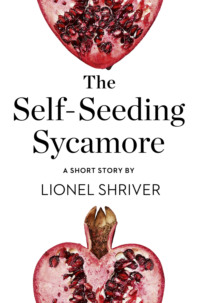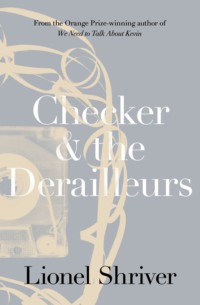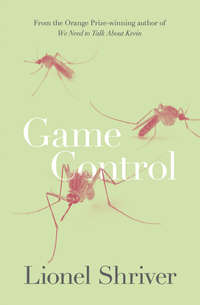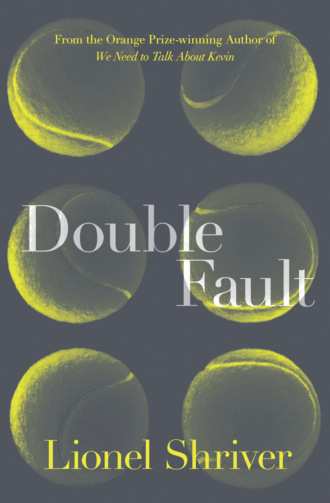
Полная версия
Double Fault

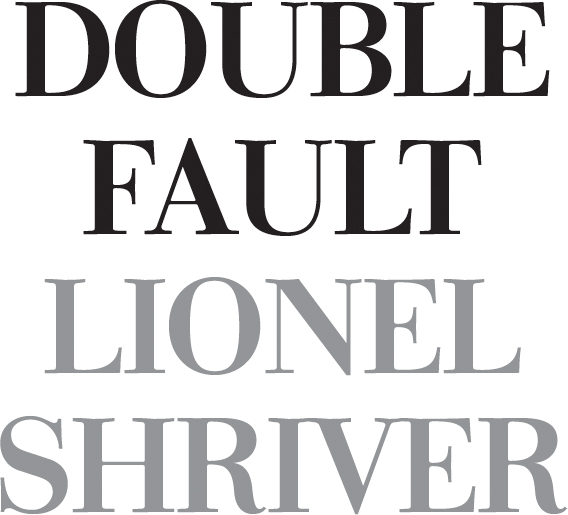

Copyright
The Borough Press
An imprint of HarperCollinsPublishers
1 London Bridge Street
London SE1 9GF
www.harpercollins.co.uk
Published by HarperCollinsPublishers 2017
First published by HarperCollinsPublishers 2017
Copyright © Lionel Shriver 1997
Cover design by Stuart Bache © HarperCollinsPublishers Ltd 2017
Cover photographs © Shutterstock.com
Lionel Shriver asserts the moral right to be identified as the author of this work
A catalogue record for this book is available from the British Library
This novel is entirely a work of fiction. The names, characters and incidents portrayed in it are the work of the author’s imagination. Any resemblance to actual persons, living or dead, events or localities is entirely coincidental.
All rights reserved under International and Pan-American Copyright Conventions. By payment of the required fees, you have been granted the non-exclusive, non-transferable right to access and read the text of this e-book on-screen. No part of this text may be reproduced, transmitted, down-loaded, decompiled, reverse engineered, or stored in or introduced into any information storage and retrieval system, in any form or by any means, whether electronic or mechanical, now known or hereinafter invented, without the express written permission of HarperCollins e-books
Source ISBN: 9780008209773
Ebook Edition © June 2017 ISBN: 9780008209780
Version: 2017-04-06
Praise for Double Fault:
‘A brilliant tale of doomed love’
Observer
‘The scenes between Willy and Eric are terrific pieces of writing: the dialogue crackles with rage, frustration and bitterness’
Independent
‘That Shriver refuses to avert her gaze, much less sweeten the pill, is what makes her such an interesting writer. She does not coax, or wheedle: she challenges. She makes you think’
Daily Telegraph
‘Shriver is a truly remarkable star in the literary firmament. She has an uncanny sense of the way women subject themselves to secret, inward torture, weighing themselves down with passionate feelings they believe socially unacceptable to bring out in the open … I doubt there is any thoughtful woman who does not recognise herself somewhere in Shriver’s writing’
LISA JARDINE, Financial Times
‘The characters and situations are utterly convincing and the level of detail in the narrative provides a ghastly gossipy pleasure’
LESLEY GLAISTER
‘Shriver doesn’t care whether her characters are likeable or not: they play off one another’s strengths and weaknesses in a mesmerizing grudge match’
Saga
‘With prose as taut as a well-strung racquet, you’ll be captivated’
Marie Claire
‘Her writing is as precise and devastating as a Federer forehand’
Belfast Telegraph
‘When feminism has become the politics that dare not speak its name, it is refreshing to find an author who will bring such renewed vigour to the gender wars’
Guardian
‘Her exploration of her characters is so fearless that although readers may not sympathise with her, they’ll understand why she’s driven to destroy what she loves’
Metro
Dedication
To Jonathan
Whose real name I may use so rarely to save it for special occasions.
Dedicated in the fervent hope that we will confine this plot to paper.
Epigraph
‘Rarely do you get something if you want it too much.
There isn’t a tennis player in the world who
can’t tell when an opponent is frightened.’
TED TINLING
Contents
Cover
Title Page
Copyright
Praise
Dedication
Epigraph
Author’s Note
chapter 1
chapter 2
chapter 3
chapter 4
chapter 5
chapter 6
chapter 7
chapter 8
chapter 9
chapter 10
chapter 11
chapter 12
chapter 13
chapter 14
chapter 15
chapter 16
chapter 17
chapter 18
chapter 19
chapter 20
chapter 21
chapter 22
About the Book
About the Author
Also by Lionel Shriver
About the Publisher
Author’s Note
In the interests of storytelling, the tennis ranking system has been simplified in this novel. Readers curious about the complexities of national versus international rankings, or the WTA versus Virginia Slims computers, should consult the copious nonfiction on the subject. A few additional liberties have been taken, for Double Fault is not so much about tennis as marriage, a slightly different sport.
chapter 1
At the top of the toss, the ball paused, weightless. Willy’s arm dangled slack behind her back. The serve was into the sun, which at its apex the tennis ball perfectly eclipsed. A corona blazed on the ball’s circumference, etching a ring on Willy’s retina that would blind-spot the rest of the point.
Thwack. Little matter, about the sun. The serve sang down the middle and sped, unmolested, to ching into a diamond of the chain-link fence. Randy wrestled with the Penn-4. It gave him something to do.
Willy blinked. “Never look at the sun” had been a running admonition in her childhood. Typical, from her parents: avert your eyes from glory, shy from the bright and molten, as if you might melt.
A rustle of leaves drew Willy’s gaze outside the fence to her left. Because the ball’s flaming corona was still burned into her vision, the stranger’s face, when she found it, was surrounded by a purple ring, as if circled for her inspection with a violet marker. His fingers hooked the galvanized wire. He had predatory eyes and a bent smile of unnerving patience, like a lazy lion who would wait all day in the shade for supper to walk by. Though his hairline was receding, the lanky man was young, yet still too white to be one of the boys from nearby Harlem scavenging strays for stickball. He must have been searching the underbrush for his own errant ball; he had stopped to watch her play.
Willy gentled her next serve to Randy’s forehand. There was no purpose to a pick-up game in Riverside Park if she aced away the entire set. Reining in her strokes, Willy caressed the ball while Randy walloped it. As ever, she marveled at the way her feet made dozens of infinitesimal adjustments of their own accord. Enjoying the spontaneous conversation of comment and reply, Willy was disappointed when her loping backhand tempted Randy to show off. Ppfft, into the net.
This late in the first set, she often gave a game away to keep the opposition pumped. But with that stranger still ogling their match from the woods, Willy resisted charity. And she wasn’t sure how much more of this Randy Ravioli (or whatever, something Italian) she could take. He never shut up. “Ran-dee!” echoed across all ten courts when his shot popped wide. Between points Randy counseled regulars in adjoining games: “Bit too wristy, Bobby old boy!” and “Bend those knees, Alicia!” Willy herself he commended: “You pack quite a punch for a little lady.” And the stocky hacker was a treasure trove of helpful advice; he’d demonstrated the western grip on the first changeover.
She’d smiled attentively. Now up 4–0, Willy was still smiling.
The Italian’s serve had a huge windup, but with a hitch at the end, so all that flourish contributed little to the effort. More, intent on blistering pace, Randy tended to overlook the nicety of landing it in the box. He double-faulted, twice.
As they switched ends again, Willy’s eyes darted to her left. That man was still leering from behind the fence. Damn it, one charm of throwaway games in Riverside was not to be scrutinized for a change. Then, he did have an offbeat, gangly appeal … Ignoring the passerby only betrayed her awareness that he was watching.
Newly self-conscious, Willy bounced the ball on the baseline six, seven times. If her coach knew she was here he would have her head, as if she were a purebred princess who mustn’t slum with guttersnipes and so learn to talk trash. But Willy felt that amateurs kept you on your toes. They were full of surprises—inadvertently nasty dinks from misconnected volleys, or wild lobs off the frame. And many of Riverside’s motley crew exuded a nutritious exultation, losing with a shy loss for words or a torrent of gee-whiz. With Randy she was more likely to earn a huffy see ya, but she preferred honest injury to the desiccated well done and two-fingered handshake of Forest Hills.
Besides, Riverside Park was just across the street from her apartment, providing the sport a relaxing easy-come. The courts’ wretched repair recalled the shattered Montclair asphalt on which Willy first learned to play: crabgrass sprouted on the baseline, fissures crazed from the alley, and stray leaves flattened the odd return. The heaving undulation of courts four and seven approximated tennis on the open sea. Poor surface mimicked the sly spins and kick-serves of cannier pros, and made for good practice of split-second adjustment to gonzo bounces. Craters and flotsam added a touch of humor to the game, discouraging both parties from taking the outcome to heart. An occasional murder in this bosky northern end of the park ensured generously available play time.
In the second set Randy started to flail. Meanwhile their audience followed the ball, his eyes flicking like a lizard’s tracking a fly. He was distracting. When the man aped “Ran-dee!” as the Italian mishit another drive, Willy’s return smacked the tape.
“You threw me off,” she said sharply.
“It shouldn’t be so easy.” The onlooker’s voice was deep and creamy.
Abruptly impatient, Willy finished Randy off in ten minutes. When they toweled down at the net post, Willy eyed her opponent with fresh dismay. From behind the baseline Randy could pass for handsome; this close up, he revealed the doughy, blurred features of a boozer.
Emerging from his towel, Randy grumbled, “I’ve been hustled.”
“There was no money on the line,” she chided.
“There’s always something on the line,” he said brusquely, “or you don’t play.”
Leaning for his racket case, Randy grabbed his spine. “Oooh, geez! Threw my back last week. Afraid I’m a pale shadow …” Zipping up, he explained that his racket had “frame fatigue”; not much better than a baseball bat, capisce?
Her coach Max often observed, When boys win, they boast; when girls win, they apologize. “I was in good form today,” Willy offered. “And you got some pretty vile bounces.”
“How about a beer?” Randy proposed. “Make it up to me.”
“No, I’ll … stick around, practice my serve.”
“What’s left for you to practice, hitting it out?” Randy stalked off with his gear.
Willy lingered to adjust the bandanna binding her flyaway blond hair. The man behind the fence threw a sports bag over the sag in the chain-link at the far end and leapt after it.
“That was the most gutless demonstration I’ve ever seen,” he announced.
“Oh, men always make excuses,” said Willy. “Beaten by a girl.”
“I didn’t mean he was gutless. I meant you.”
She flushed. “Pardon?”
“Your playing that meatball is like a pit bull taking on a Chihuahua. Is that how you get your rocks off?”
“In case you haven’t noticed, I don’t have rocks.”
The lanky man clucked. “I think you do.”
While Randy looked sexy from a court away and disillusioning face to face, this interloper appeared gawky and ungainly at a distance, his nose lumpy and outsized, his brow overhung, his figure stringy. But close up the drastic outlines gave way to a subtler, teasing smile, and elusive, restless eyes. Though his torso narrowed to a spindly waist, his calves and forearms widened with veiny muscle.
“Somebody’s got to put loudmouths in their place,” she snapped.
“Other loudmouths. You tired?”
Willy glanced at her dry tank top. “If I were, I wouldn’t admit it.”
“Then how about a real game?” He spun his racket, a solid make. He was cocky, but Willy Novinsky hadn’t turned down the offer of a tennis game for eighteen years.
At the first crack of the ball, Willy realized how lazily she’d been playing with Randy. She botched the first three warm-up rallies before reaching into her head and twisting a dial. Once it was adjusted up a notch, threads of the bedraggled net sharpened; scuffled paint at her feet flushed to a more vivid green. White demarcations lifted and seemed to hover. Fissures went blacker and more treacherous, and as it hurtled toward her the ball loomed larger and came from a more particular place.
She played guardedly at first, taking the measure of her opponent. His strokes were unorthodox; some replies came across as dumb luck. His form was in shambles; he scooped up one last-minute ball with what she could swear was a golf swing. But he lunged for everything. When she passed him his racket was always stabbing nearby, and though many a down-the-line drive was too much for him, she never caught him flat-footed on his T just glooming at it.
And there were no Ran-dee!’s. He never apologized or swore. He didn’t mutter Get it together, Jack! or, for that matter, Good shot. When her serve was long he raised his finger; at an ace he flattened his palm. In fact, he didn’t say one word for the whole match.
The game was over too soon at 6–0, 6–2. Willy strolled regretfully to the net, promising herself not to hand him excuses, but also not to gloat. Despite the lopsided score, they’d had some long, lovely points, and she hoped he would play her again. Before she’d formulated a remark striking just the right gracious yet unrepentant note, he reached across the tape, grasped Willy’s waist, and lifted her to the sky.
“You’re so light!” he extolled, lowering her gently to the court. “And unbelievably fucking powerful.” He wiped his palm on his sopping T-shirt, and formally extended his hand. “Eric Oberdorf.”
They shook. “Willy Novinsky.”
She’d been braced for the usual grumpy terseness, or an affected breeziness as if the contest were mere bagatelle, expressed in an overwillingness to discuss other matters. But grinning ear to ear, he talked only of tennis.
“So your father dangled a Dunlop-5 over your crib, right? Dragged you from the Junior Open to the Orange Bowl while the rest of us were reading ‘Spot is on TV.’ And don’t tell me—Dad’s on his way here. Since even now you’re nineteen, he still tucks you in at ten sharp. His little gold mine needs her rest.”
That she was already twenty-three was such a sore point that she couldn’t bear correcting him. “Don’t hold your breath. Daddy’s in New Jersey, waiting for me to put away childish things. Like my tennis racket.”
Which was just what she was doing, when Eric stayed her arm. “Unwind with a few rallies?”
Willy glanced at the sky, the light waning. She’d been playing a good four hours, the limit on an ordinary day. But the air as it eased from rose to gray evoked afterwork games with her father, when he’d announce that Mommy would have supper ready and Willy would plead for a few points more. On occasion, he’d relented. She was not about to become the grown-up who insists it’s time to quit. “A few minutes,” she supposed.
Eric volleyed. Tentatively she suggested, “Your backswing —take it no farther than your right shoulder.”
In five minutes, Eric had trimmed his backswing by three inches. She eyed him appreciatively. Unlike the average amateur, whose quantity of how-to books and costly half-hour sessions with burned-out pros was inversely related to his capacity to apply their advice, Eric had promptly installed her passing observation like new software. She felt cautious about coaching if it manifested itself in minutes, for turning words into motion was a rare knack. With such a trusting, able student she could sabotage him if she liked, feeding him bad habits like poisoned steak to a dog.
Zipping his cover, Eric directed, “Time we had Randy’s beer. Flor De Mayo. I’m starving.”
“I may have missed it—was that asking me out?”
“It was telling you where we’re having dinner.”
“How do you know I don’t have plans with a friend?”
“You don’t,” he said simply. “I doubt you have a lot of friends.”
“I seem that likable?” she asked sardonically.
“No one with your tennis game is likable. And no one with your tennis game spends much time holding hands in bars.”
“You’re going to change all that?” she jeered.
“As for loitering in gin mills, no. But a hand to hold wouldn’t do you a speck of harm.” Eric grabbed Willy’s athletic bag as well as his own, and strode in the twilight with both carryalls toward court three with a self-satisfied jaunt. He had correctly intuited that wherever her rackets went, Willy was sure to follow.
“So where’d ‘Willy’ come from?”
Her imprecations to consider the West Side Cafe’s pleasant outdoor tables having been resolutely ignored, they were seated snugly inside Flor De Mayo. Willy was recovering from a petty sulk that she’d been co-opted into a Cuban-Chinese greasefest. At least the restaurant was clean and not too frenetic; the white wine was drinkable.
“Would you go by ‘Wilhemena’?”
“Yikes. What were your parents trying to do to you?”
“Let’s just say it’s not a name you expect to see in lights. My older sister fared even worse— ‘Gertrude,’ can you believe it? Which they hacked barbarously down to ‘Gert.’”
“They have something against your sister?”
Willy screwed up her eyes. He was just making conversation, but she had so few opportunities to talk about anything but open-versus closed-stance ground strokes that she indulged herself. “They have something against the whole world, in which we’re generously included. But my parents bear Gert no special ill-will. Their feelings for my sister are moderate. Moderation is what she invites. In high school, she made B’s on purpose. Now she’s studying to become a CPA. The sum of this calculated sensibleness is supposed to make my father happy. It doesn’t. In my book, they both deserve what they’ve got … I’m sorry, you have no reason to be faintly interested in any of this.”
“Oh, but I am.”
Afraid he was going to add something flirty and odious, she went on quickly, “I think they scrounged ‘Wilhemena’ and ‘Gertrude’ from the nursing home where my mother works. Even as kids, we sounded like spinsters.”
Eric knocked back his beer with gusto. “You’re awfully young to worry about becoming an old maid.”
In the terms of her profession Willy was already shuffling toward her dotage; this man instinctively honed in on soft spots. “I’m not,” she fended off lightly. “It’s the implausibility of ‘Wilhemena Novinsky’ on a Wimbledon scoreboard that’s unsettling.”
“Wee-Willy-Wimbledon. ’Sgot a ring. Besides: shitty name, one more obstacle to overcome. On which you thrive, I’m sure. They did you a favor.”
All this assumed familiarity was grating, and only the more intrusive for being accurate. “If I thrive on obstacles, my parents have done me dozens of favors.”
The waiter arrived with their baked half-chickens with mountains of fried rice. Eric had ordered two plates for himself, which he arranged bumper to bumper.
“You’re going to eat all that?”
“And the remains of yours, when you don’t finish it.”
“How do—?” She gave up. He was right. She wouldn’t.
The rice was marvelous, scattered with pork and egg. The chicken lolled off the bone. “Don’t look so greedy,” said Willy. “I may finish more than you think.”
“Just promise me you won’t go puke it up afterwards.”
“I’m not that trite.”
“No tennis dad, no bulimia, and you’re not overweight,” Eric ticked off on his fingers. “Too good to be true. You must be having an affair with your coach.”
Willy was a sucker for any contest, but this was the limit. “None of your business.”
His eyes flickered; he could as well have scribbled her response on a scorecard.
“While I’m being crass …” Eric dabbed his mouth with his napkin; she couldn’t understand how he could suck up all that rice in such a mannerly fashion. She’d have predicted he’d eat like an animal. “What’s your ranking?”
There was no getting away. In tennis circles, this question arose five times a day, though it secreted far more malice than What’s your sign?
Willy placed her fork precisely beside the vinegar, then edged the tines a quarter inch, as if to indicate the incremental nature of progress in her sport. “I’m ranked 437. But that’s in the world—”
He raised his hands. “I know! I’m surprised your ranking is so high.”
“Surprised! I pasted you today!”
He laughed. “Wilhelm!” He pronounced her new name with a Germanic V. “I just meant that I don’t expect to run into a top 500 in the course of the average day. Touchy, touchy.”
“There’s not a tennis player on earth,” Willy grumbled, picking her fork back up, “who isn’t sensitive about that number. You could as well have asked on our first date how much money I make, or whether I have AIDS.”
“Is that what this is?” he asked gamely. “A date?”
“You know what I mean,” she muttered, rattled. “A ranking is … like, how valuable a person you are.”
“Don’t you think you’re giving them a little too much power?” Eric rebuked her, for once sounding sincere.
She asked sarcastically, “And who’s they?”
“They are whoever you can’t allow to beat you,” Eric returned. “And the worst capitulation is thinking just like the people who want your hide.”
“So maybe you’re my they?”
“I’m on your side.”
“I’ve only had one person on my side in my life.”
“Yourself?”
“No,” she admitted, “I am not always on my own side.” This was getting abstruse. “I mean a real person.”
“But didn’t you like it?”
“Yes.” The question made her bashful. “Can we stop talking about me for a second? Like, what do you do?”
“I graduated from Princeton in May. Math. Now I’m taking some time out to play.”
“With me?”
“Yes, but play, not toy. Playing is serious business. You of all people should know that.”
“Do you … have any brothers and sisters?” The low grade of repartee in locker rooms had left Willy rusty and obvious over dinner.
“Three brothers. My father wants to take over the world.”
She let slide the implication that a patriarch would only do so with boys. “You,” she determined, “are the oldest.”


